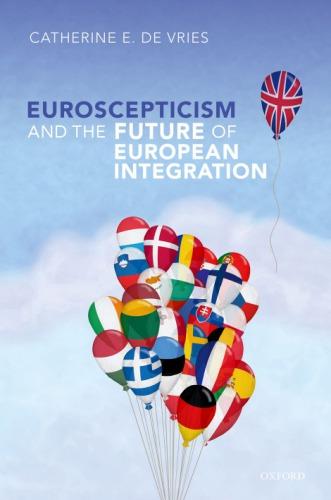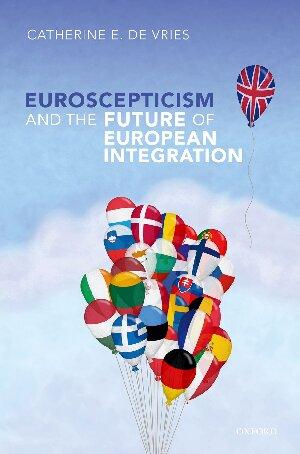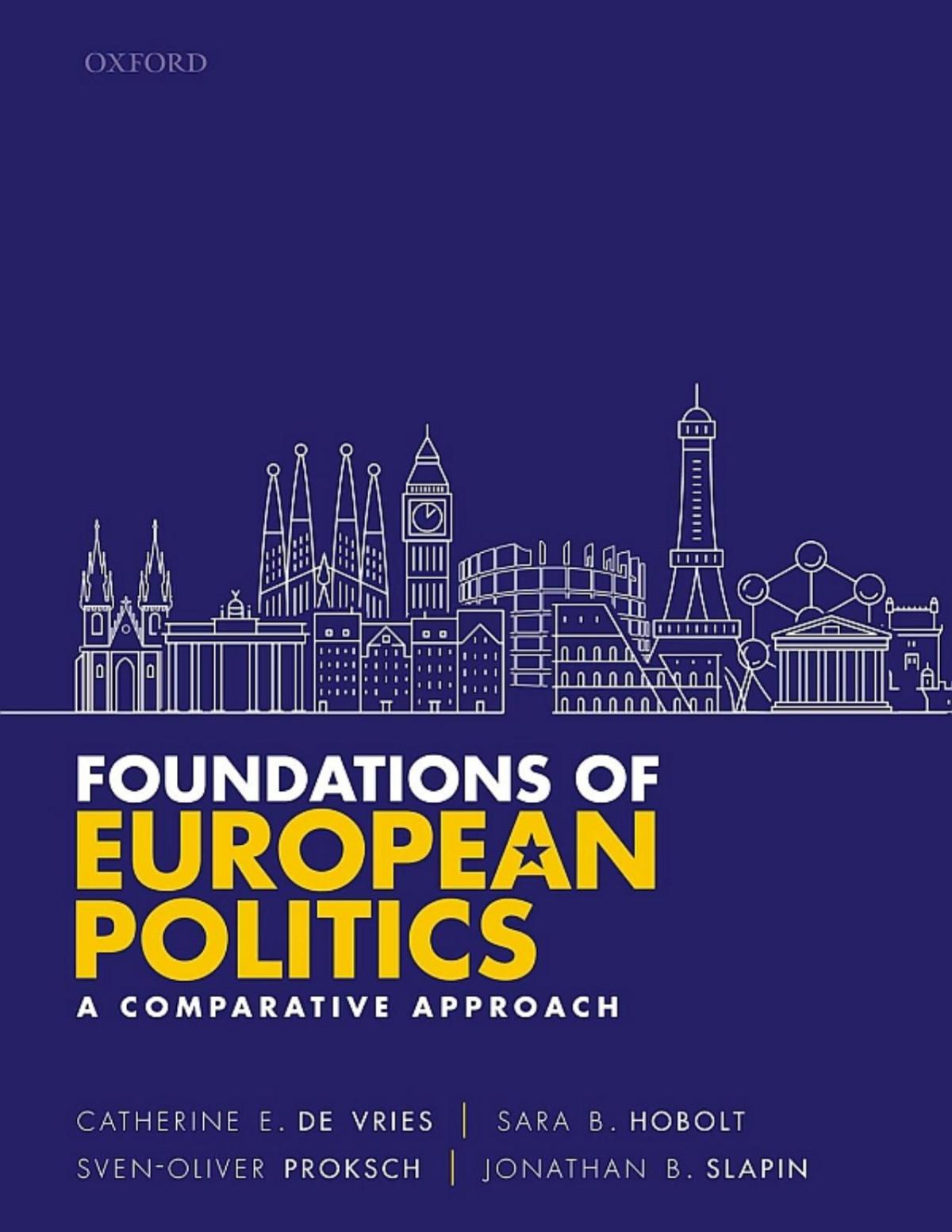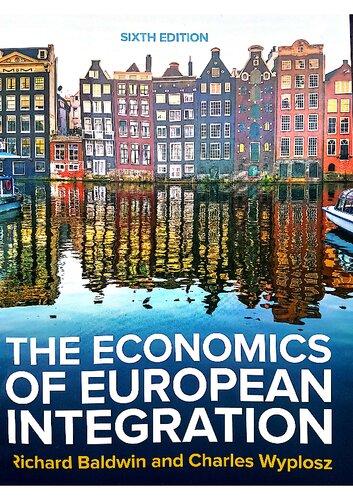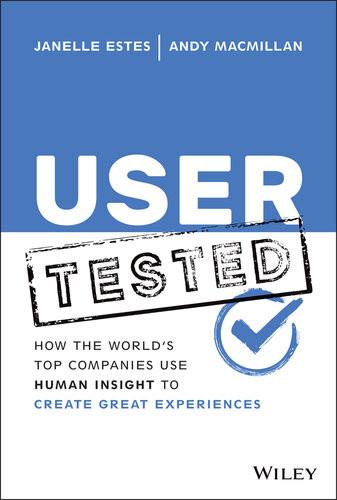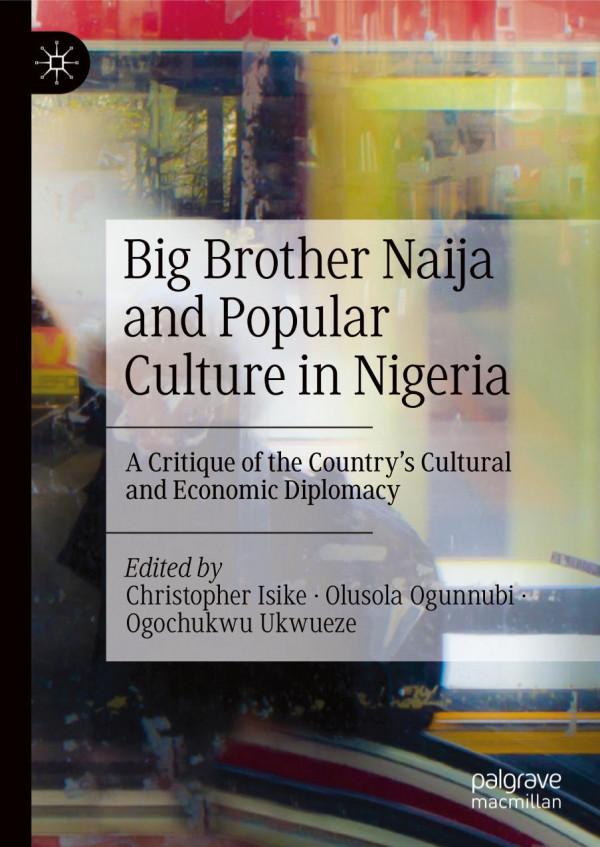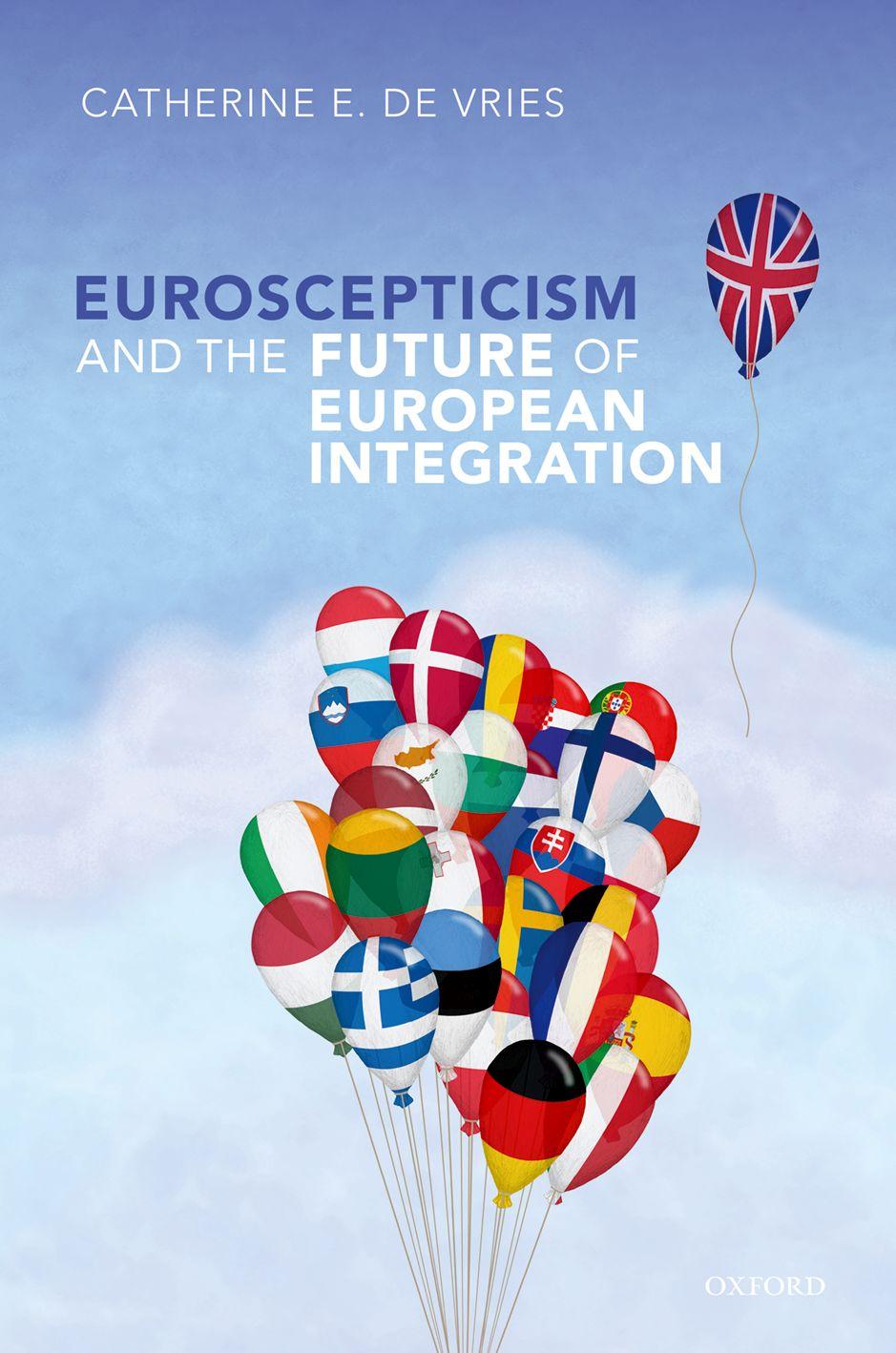https://ebookmass.com/product/euroscepticism-and-the-futureof-european-integration-de-vries/
Instant digital products (PDF, ePub, MOBI) ready for you
Download now and discover formats that fit your needs...
Euroscepticism and the Future of European Integration
Catherine E. De Vries
https://ebookmass.com/product/euroscepticism-and-the-future-ofeuropean-integration-catherine-e-de-vries/
ebookmass.com
Foundations of European Politics Catherine E. De Vries & Sara B. Hobolt & Sven-Oliver Proksch & Jonathan B. Slapin
https://ebookmass.com/product/foundations-of-european-politicscatherine-e-de-vries-sara-b-hobolt-sven-oliver-proksch-jonathan-bslapin/
ebookmass.com
The Economics of European Integration 6th Edition Richard E. Baldwin
https://ebookmass.com/product/the-economics-of-europeanintegration-6th-edition-richard-e-baldwin/ ebookmass.com
User Tested: How the World's Top Companies Use Human Insight to Create Great Experiences Janelle Estes
https://ebookmass.com/product/user-tested-how-the-worlds-topcompanies-use-human-insight-to-create-great-experiences-janelleestes-2/ ebookmass.com
The Complete Enochian Dictionary: A Dictionary of the Angelic Language as Revealed to Dr. John Dee and Edward Kelley Donald C. Laycock
https://ebookmass.com/product/the-complete-enochian-dictionary-adictionary-of-the-angelic-language-as-revealed-to-dr-john-dee-andedward-kelley-donald-c-laycock/ ebookmass.com
Nanocolloids for Petroleum Engineering: Fundamentals and Practices Baghir Suleimanov
https://ebookmass.com/product/nanocolloids-for-petroleum-engineeringfundamentals-and-practices-baghir-suleimanov/
ebookmass.com
The Wild Coast Lin Anderson
https://ebookmass.com/product/the-wild-coast-lin-anderson/
ebookmass.com
Presentation Essentials: The Tools You Need to Captivate Your Audience, Deliver Your Story, and Make Your Message
Memorable Anne Bruce
https://ebookmass.com/product/presentation-essentials-the-tools-youneed-to-captivate-your-audience-deliver-your-story-and-make-yourmessage-memorable-anne-bruce-2/ ebookmass.com
Towards Sustainable Chemical Processes: Applications of Sustainability Assessment and Analysis, Design and Optimization, and Hybridization and Modularization 1st Edition Jingzheng Ren
https://ebookmass.com/product/towards-sustainable-chemical-processesapplications-of-sustainability-assessment-and-analysis-design-andoptimization-and-hybridization-and-modularization-1st-editionjingzheng-ren/ ebookmass.com
Big Brother Naija and Popular Culture in Nigeria: A Critique of the Country's Cultural and Economic Diplomacy
1st ed. 2023 Edition Christopher Isike
https://ebookmass.com/product/big-brother-naija-and-popular-culturein-nigeria-a-critique-of-the-countrys-cultural-and-economicdiplomacy-1st-ed-2023-edition-christopher-isike/ ebookmass.com
Preface
Thisbookprovidesanewchapterinaclassicconversation.Itexaminesthe roleofpublicopinionintheEuropeanintegrationprocess.Almosthalfa centuryago,theEuropeanUnionstartedtocommission,fund,andundertake oneofmostintenseandlongrunningprogrammesofcross-nationalsurvey researchanywhereintheworldthroughtheEurobarometer.1 Sincethen academics,policymakers,andpunditshavestartedtochartthepolicypreferencesofEuropeanpublics.Althoughthelocusofattentionhasshifted recentlyfromunderstandingsupporttoscepticism,thecorequestionatthe heartofsocietalandscholarlydebateshaslargelyremainedthesame:what explainsvariationinattitudestowardsEuropeanintegration?Thisbooksuggeststhatthewidespreadfascinationwithexplanationhaspartlybeenatthe expenseofourunderstandingoftheexactnatureofpublicopinionandthe roleitplaysintheEuropeanintegrationprocess.Byredirectingourfocus,this bookprovidesamuch-neededaccountoftheconceptualization,causes,and consequencesofpublicopinionintheEuropeanUnion.
Theideaforthisbookwastheresultoftwodinnerconversations.The first tookplaceinSeptember2014.Atthattime,theEurozonecrisishadtakenits gripontheEuropeancontinent,andmyhusbandandIhadmanyconversationsabouttheeffectsofthecrisisandthereformsneededtosafeguardthe futureoftheEuropeanproject.Inoneofthese,Imentionedthe ‘starkrisein unemployment’ thatmyhomecountrytheNetherlandshadexperienced since2012andhowitmayhavecontributedtotheelectoralgainsofEuroscepticparties.Myhusband,aSpanishpoliticaleconomist,wasclearly annoyedbymychoiceofwords.HesuggestedthatImightthinkaboutthe Dutchexperienceinabroaderperspective,andpointedtowardsthedire situationinSpain.Hetriedtomakemeunderstandwhat ‘realunemployment anddeepstructuralproblemsinthelabourmarket’ looklike.Thisexchangeof perspectivesoverthedinnertablemademerealizethatmyviewsaboutthe
1 TheEurobarometerhasconductedbiannualsurveysinalltheEUmemberstates(aswellas somecandidatecountries)since1973.Whileitspurposeistochartthepolicypreferencesof EuropeanpublicsandprovideinputforEUpolicymaking,theEurobarometersurveyshave providedaninvaluableresourceforacademicresearchinEurope.Formoreinformationsee http://ec.europa.eu/public_opinion/index_en.htm.
Europeanproject,thesinglecurrency,andthepossibilityforreformwere taintedby ‘my’ nationalperspective.
ThesecondconversationtookplaceattheannualmeetingoftheEuropean PoliticalScienceAssociationinViennainJune2015.Onthelasteveningof theconference,Ihaddinnerwithcolleagues.Oneofthesewasmyfriendand co-author,EliasDinas,whoisGreek.Duringdinner,Eliaswaseagerlytryingto getaholdofhismotherinGreece.EarlierthatdaytheGreekgovernmenthad restrictedtheamountsofmoneypeoplewereallowedtowithdrawfromtheir bankaccounts.Hismotherurgentlyneededcashforgroceriesandwasnot abletogetholdofhermoney.Ourdinnerconversationaboutthesituationin GreeceandtheroletheEuropeanUnionplayedinit,againstthebackdropof peoplegoingabouttheirnormallivesonaSaturdaynightinVienna,made merealizeagainthatthewayeachofusseestheEuropeanprojectand evaluatesitisdeeplyinfluencedby ‘our’ nationalviewpoints.Thesetwo dinnerconversationsandmanyotherexchangessincethenledmetothe insightthatunderpinsthisbookandthetheoryofEuropeanpublicopinionit presents: people’sevaluationsofandexperienceswiththeEuropeanprojectare fundamentallyframedbythenationalcircumstancesinwhichthey findthemselves.
Althoughtheideathatnationalconditionsmatterforpublicopinionabout Europeanintegrationhasbeenaddressedintheliteraturebefore,mostnotably intheimportantcontributionsofIgnacioSánchez-Cuenca(2000)andRobert Rohrschneider(2002),wecurrentlylackanunderstandingoftheexactwayin whichtheydoandhowtheyrelatetobehaviourinelectionsandreferendums. ThisbookpresentsabenchmarktheoryofpublicopiniontowardsEuropean integration.Itprovidesbothacomprehensivecountryandindividuallevel mechanismofhownationalandEuropeanevaluationsarelinkedandinteract toproducecertainkindsofbehaviouralconsequences.Thecontributionofthis bookisnotonlytoprovideaninsightintohowpublicopinion,andespecially Euroscepticism,isstructured,howitcomesabout,howitchangedinthemidst oftheEurozonecrisis,andhowitislinkedtonationalconditions,butalso whatpossibleconsequencesithasforthefutureoftheEuropeanproject.
Thewritingofthisbookhasbeenanextremelyrewardingexperiencethat wouldnothavebeenpossiblewithoutthehelpofothers.Somepeopleadvised meoveracupofcoffee,whileothersattendedvarioustalksorworkshops whereideaswerepresented,andothersagaintookvaluabletimeoutoftheir busyschedulestoreadentiredraftsofthemanuscript.Averyspecialthank yougoestotheBertelsmannFoundationandinparticularIsabellHoffmann. Alargepartofthedatacollectionwouldnothavebeenpossiblewithoutthe generoussupportoftheBertelsmannFoundation.Iamgratefulfortheir continueddedicationtounderstandingthecontoursofpublicopinionin Europe.EspeciallymyclosecooperationwithIsabellhasbeencrucially importantformythinking.Iwishtothankherforallheradviceandher
waysofchallengingmetoalwaysthinkaboutthebiggerpictureandthe politicalramificationsofmy findings.
Second,Iwouldliketoexpressmygratitudetoseveralwonderfulcolleagues whohavehelpedsharpenmythinking.Therearemany,butIespeciallywish tothankEliasDinas,DavidDoyle,AinaGallego,TimHaughton,Armèn Hakhverdian,StephanieHofmann,ElisabethIvarsflaten,SpyrosKosmidis, GaryMarks,RobertRohrschneider,ChristinaSchneider,MarcoSteenbergen, andMarikenVanderVeldenfortheirextremelyhelpfulcommentsonvarious ideasanddrafts.AspecialthankyoualsogoestoKalypsoNicolaïdisandthe staffattheCentreforEuropeanStudiesattheUniversityofOxfordfor organizingabookworkshopinFebruary2017.Atthisworkshopsomeofmy formerOxfordcolleaguesandstudentstookthetimetoengagewithmyideas. IespeciallywanttothankKalypsoandAlexanderKuofortheirextremely insightfulandconstructivecommentsandthoroughreadingofthebook.In addition,IwishtoacknowledgetwoverybrightstudentsinInternational RelationsatOxford,KiraHujuandChristineGallagher,whoprovidedvery helpfulcomments.IalsowishtothankDominicByatt,myeditoratOxford UniversityPress,forhiscontinuedsupport.Hisadviceonhowtowriteabook aboutatargetthatiscontinuouslychangingwasextremelyvaluable.
Finally,Iwishtothankfourpeopleinparticularwhostoodbymeinthe processofwritingthisbook.The firstismylongstandingfriendandco-author SaraHobolt.Yourclarityofthoughtanddedicationtounderstandingthedeep problemstheEuropeanUnionfacesatthepresenttimeamazesmeeverytime wemeet.Thisbookhasbenefitedfromallourexchangesandyourthoughtful insights.Ouracademicandpersonalfriendshipmeanssoverymuchtome. Thesecondismy ‘Doktor-Mutter’ andco-authorLiesbetHooghe.Without yourvaluableadvice,critique,andsupportthismanuscriptwouldneverhave beenpublished.Youareaninspirationtometothisday.Ialsowishto wholeheartedlythankmyhusbandandco-author,HéctorSolaz.Iameternally gratefulforallthelongwalksandtalksduringwhichyousupportedmewhen Ifeltstuck,andclarifiedthecoreargumentIwantedtomaketomyself.Thank youforeveryminute.Withoutyourloveandsupportthisbookwouldhave neverseenthelightofday.Finally,IwanttothankmylittledaughterMila. YoumovesogracefullybetweenthreeEuropeanculturesandlanguages.Your lifetrulyrepresentswhatEuropeanconnectednessismadeof.Ihopeforyou andforyourfuturelifecompanionsthatEurope findsawaytochampionits accomplishmentsandcherishitsdifferencesasstrengthsratherthanas weaknesses.
May2017
Braiswick
PartIII.ATypologyofSupportandScepticism
4.ADividedPublic?TypesofSupportandScepticism
5.CommonPeople?WhoAreSupportersand ScepticsandWhatDoTheyWant?
5.1TheDemographicPro
PartV.PublicOpinionandTheFutureofEuropeanIntegration
8.ChangeorDie?EUReformPreferencesamongSupporters
8.1MeasuringtheReformPreferencesofSupporters
ListofFigures
0.1.Atypologyofsupportandscepticism9
1.1.HardEuroscepticpartysupportinthe2014EuropeanParliamentary elections 15
1.2.AcomparisonofSunderlandandBournemouth18
1.3.Therelationshipbetweenfeelingsofexclusivenationalidentity andhardEuroscepticpartysupportinthe2014European Parliamentaryelections20
1.4.Trendsinfeelingsofexclusivenationalidentityandextremeright votesharesintheNetherlands22
1.5.LeaveandEuroscepticpartysupportinGreatBritainandSpain24
1.6.ApprovalofpoliciesandregimeattheEULevelinGreatBritain andSpain25
1.7.ApprovalofpoliciesandregimeatthenationalandEUlevelin GreatBritainandSpain26
2.1.DefiningEUsupport38
2.2.DefiningEUscepticism39
2.3.EUregimeandpolicydifferentialacrosstime50
2.4.EUregimeandpolicydifferentialacrosstimeandspace51
2.5.EUregimeandpolicydifferentialbyunemployment52
2.6.EUregimeandpolicydifferentialbyqualityofgovernment52
2.7.ChangesinEUregimeandpolicydifferentialsbetween2004and 2014acrossspace53
2.8.ChangesinnationalandEuropeanregimeevaluationsbetween 2004and2014acrossspace54
2.9.ChangesinnationalandEuropeanpolicyevaluationsbetween 2004and2014acrossspace55
4.1.Fourtypesofsupportandscepticism78
4.2.PlottingcountriesinanEUdifferentialspacein201481
4.3.Typesofsupportandscepticismin201482
4.4.Typesofsupportandscepticismacrosscountriesin201483
4.5.Distributionoftypesbyeconomicconditionsin201485
4.6.Distributionoftypesbyqualityofgovernmentin201487
4.7.Changeintypes2008–201489
4.8.Changeintypes2008–2014acrosscountries90
4.9.Changeintypesbynationalconditions2008–201491
4.10.Typesin2008and201492
4.11.Theeffectofeconomicandpoliticalsystemsatisfactionon supportandscepticism94
4.12.Expectationsofdemocracybynationalconditions98
4.13.Responsibilityjudgementsbynationalconditions99
5.1.Unemploymentamongthefourtypes106
5.2.Financialworryamongthefourtypes107
5.3.Socialpositioningamongthefourtypes108
5.4.Skilllevelsamongthefourtypes109
5.5.Gendergapamongthefourtypes110
5.6.Agegapamongthefourtypes111
5.7.Educationlevelamongthefourtypes112
5.8.Policyresponsibilityamongthefourtypes115
5.9.Issueprioritiesamongthefourtypes116
5.10.Issueprioritiesofloyalsupportersbynationalconditions118
5.11.Issueprioritiesofpolicyscepticsbynationalconditions119
5.12.Issueprioritiesofregimescepticsbynationalconditions119
5.13.Issueprioritiesofexitscepticsbynationalconditions120
5.14.Predictingissuepositionsbythefourtypes122
5.15.Predictingpolicypositionsbythefourtypesandnationalconditions123
5.16.NationalandEuropeanattachmentamongthefourtypes125
5.17.Predictingnationalattachmentbythefourtypes125
6.1.ConditionsforsecondorderandEUissuevoting132
6.2.Euroscepticmembersofthe2014EuropeanParliament133
6.3.Issueprioritiesamongthefourtypes137
6.4.Issueprioritiesacrossmemberstates138
6.5.SupportforEuroscepticpartiesamongthefourtypes141
6.6.HardversussoftEuroscepticpartysupportamongthefourtypes142
6.7.LeftversusrightEuroscepticpartysupportamongthefourtypes143
6.8.LeftEuroscepticpartysupportbyunemploymentandimmigration aspriority144
6.9.RightEuroscepticpartysupportbyunemploymentandimmigration aspriority145
6.10.ChangeinEuroscepticpartysupportbyviewsonmigration147
6.11.ChangeinEuroscepticpartysupportbyviewsonnationalcontrol148
6.12.ChangeinEuroscepticpartysupportbyviewsonredistribution149
6.13.ChangeinEuroscepticpartysupportbyviewsonstateintervention intheeconomy150
7.1.Remainsupportamongthefourtypes,Britishrespondentsonly157
7.2.Remainsupportamongthefourtypesbyissuepriority,British respondentsonly158
7.3.Predictingremainsupportamongthefourtypes,British respondentsonly160
7.4.Remainsupportamongthefourtypes162
7.5.Remainsupportamongthefourtypesacrosscountries163
7.6.Remainsupportamongthefourtypesbyissuepriority164
7.7.Remainsupportamongthefourtypesbyviewsonforeigners165
7.8.Remainsupportamongthefourtypesbyviewsonglobalization166
7.9.Predictingremainsupport167
7.10.Predictingremainsupportamongthefourtypesbyanti-foreigner sentiment169
7.11.Predictingremainsupportamongthefourtypesbyanti-globalization stance 170
7.12.Predictingremainsupportamongthefourtypesbyanti-elitiststance171
7.13.Differenceinremainsupportamongthefourtypes,April–August2016172
7.14.Changeinremainsupportamongthefourtypes,April–August2016173
7.15.RemainsupportamongthefourtypesinApril–August2016in fivecountries174
7.16.Changeinremainsupportamongthefourtypes,April–August 2016in fivecountries174
7.17.RemainsupportamongthefourtypesbyBrexitexpectation175
8.1.SupportforEUreformin28memberstates190
8.2.SupportforEUreformin28memberstatesbynationalconditions191
8.3.SupportforEUreformamongloyalsupportersin28memberstates193
8.4.SupportforEUreformamongpolicyscepticsin28memberstates194
8.5.SupportforEUreformamongregimescepticsin28memberstates195
8.6.SupportforEUreformamongexitscepticsin28memberstates195
8.7.Supportforeconomicreformamongthefourtypes196
8.8.Supportforeconomicreformamongthefourtypesbynational conditions197
8.9.ExpectationsaboutfutureofEurozoneamongthefourtypes198
8.10.ExpectationsaboutfutureofEurozoneamongthefourtypesby nationalconditions199
8.11.SupportforEurozonebudgetand financeministeramongthe fourtypes200
8.12.SupportforEurozonebudgetand financeministeramongthe fourtypesbynationalconditions200
8.13.SupportforEUresponsetomemberstatein financialdifficulty amongthefourtypes201
8.14.SupportforEUresponsetomemberstatein financialdifficulty amongthefourtypesbynationalconditions202
9.1.Summaryofthedifferencesbetweenthefourtypes208
ListofTables
2.1.Cross-validationofEUdifferentialmeasures49
3.1.Fourtypesofevents60
3.2.Selectionofevents62
3.3.EffectofeventtypeontheEUregimedifferential63
3.4.Effectofnationalcorruptionvignette68
3.5.EffectonEUpolicydifferential69
3.6.Effectofpoliticalsophistication71
3.7.Differenceintreatmenteffectbypoliticalsophistication72
4.1.Testingtheproximateresponsibilityattributionassumption100
5.1.Changesinpredictedsupportandscepticismbasedon socio-demographicvariables113
6.1.HardandsoftEuroscepticpartiesincludedinthe2014EES134
8.1.Exampleofachoiceintheconjointexperiment188
8.2.Attributesofdifferentdimensions188
A.1.Balancestatistics223
A.2.Resultsofplacebotests224
A.3.Resultsofsmall-HsiaotestsofIIAassumption225
LosingHeartsandMinds?TakingStock ofEUPublicOpinion
Obsessedwiththeideaofinstantandtotalintegration,wefailedtonoticethat ordinarypeople,thecitizensofEuropedonotshareourEuro-enthusiasm.Disillusionedwiththegreatvisionsofthefuture,theydemandthatwecopewiththe presentrealitybetterthanwehavebeendoinguntilnow.
DonaldTusk,30May2016,Brussels
TheEuropeanUnion(EU)1 iscurrentlyfacingoneoftherockiestperiodsinits sixtyyearsexistence.Notofteninitshistoryhasthecountrybloclookedso economicallyfragile,soinsecureabouthowtoprotectitsborders,sodivided overhowtotacklethecrisisoflegitimacyfacingitsinstitutions,andsounder assaultbyEuroscepticpoliticalentrepreneurs.Whilegovernmentleadersaim to findunity,intergovernmentalconferencesinrecentyearshavebeenbeset bydeepdivisionsoverhowtobringtheEurozoneandrefugeecrisestoanend. ThedreamofEurope’sfoundingfatherJeanMonnettobuildaUnionofmen ratherthanstatesseemsalmostoutofreach.Theselatestdevelopmentshave leftamarkonpublicopinion.Euroscepticsentimentisontherise.Itisno longeraphenomenontiedtosmallsegmentsofsociety,extremistpolitical partiesortospecificeconomiccycles.TheoutcomeoftheBrexitreferendum inGreatBritain2 provideda firstglimpseofwhatmaylieaheadwhenEuroscepticsentimenthardens.InJune2016,againsttherecommendationof mostpoliticalandeconomicexperts,theBritishpeoplevotedtoleavetheEU.
1 TheEuropeanUnion(EU)haschangeditsnameseveraltimesduringitsexistence.Inthis book,Iwillusethewords ‘EU’ , ‘Europe’,and ‘Union’ interchangeably.
2 Inthisbook,IwillusethetermGreatBritainratherthantheUnitedKingdom.Thisisbecause someofthepublicopiniondatasourcesthatIusedonotalwaysincludeNorthernIreland.Inorder tobeconsistent,IrelyondatafromGreatBritainonly.
TheresultsentashockwavethroughthepoliticalestablishmentinLondon, Brussels,andbeyond.WastheresultbasedonBritishexceptionalism,or indicativeofalargerprocessofarevoltagainstBrussels?TheBritishpublic hasalwaysdisplayedastrongerpulltowardsEuroscepticismcomparedto publicopiniononthecontinent.Yet,recentelectioncontestsdemonstrated asteadyriseofEuroscepticsentimentthroughoutmanypartsoftheUnion.In fact,Euroscepticpartieshaveseizedtheirlargestevervotesharesinthe2014 EuropeanParliamentelections.
TheseelectionandreferendumoutcomeshavetobeseenagainstthebackdropoftheeconomicandpoliticalchallengesthattheEUhasfacedinthe previousdecadeorso.TheEurozoneandrefugeecriseshaveprovedtobereal stresstestsforEurope.Whileeconomicrecoverymaybeonitsway,atleastin somememberstates,whatmanycitizenshavelearntfromtheserecenttribulationsisnottoblindlytrustpoliticiansandtechnocratswhoblithelypromise thatmoreEuropewillautomaticallydelivereconomicprosperityandgeopoliticalstability.Foralongtimepublicopinionwasviewedaslargelyirrelevant foranunderstandingofthecourseofEuropeanintegration.Thisviewpointis perhapsbestreflectedinthewritingofErnstHaas.Inhisseminalvolume The UnitingofEurope,Haas(1968:17)wrote: ‘Itisasimpracticableasitisunnecessarytohaverecoursetogeneralpublicopinionsurveys....Itsufficestosingle outanddefinethepoliticalelitesintheparticipatingcountries,tostudythe reactionstointegrationandassesschangesinattitudeontheirpart.’ Thedays ofapermissiveconsensusinwhichelitescouldpursuefurtherintegrative stepswithlittletonoregardforpublicopinionaregone(HoogheandMarks 2009;Risse2015).LeadersinBrusselsandthroughoutEurope’scapitalsare confrontedwithanewandchallengingpoliticalreality.Atatimewhen Europefacessomeofitsbiggesteconomic,political,andsocialchallenges sincetheSecondWorldWar,theintegrationprojectitselfhasbecomehighly contestedamongthepublic.Asaresult,theEU findsitselffacedwithan existentialchallenge: theunprecedenteddevelopmentinsupranationalgovernance inrecentyearshasledtogreaterpubliccontestation,yetatthesametimetheUnionis morereliantonpublicsupportforitscontinuedlegitimacythaneverbefore.
0.1KeyQuestions
Thedaysofthepermissiveconsensusareover,butthequestionis:whathas comeinitsplace?Pundits,journalists,andpoliticianssuggestthatweare currentlydealingwith ariseinEuroscepticism.Feelingsofdiscontentand angeroverBrussels’ dividedresponsetoeconomicdownturnandrefugee flowsseemtohaveplummetedpublicsupportfortheEuropeanprojectto anall-timelow.ThissentimentisillustratedbytheformerPresidentofthe
EuropeanCouncilHermanVanRompuy(2010:10)whoinhisspeechon 9November2010inBerlincommemoratingtheKristallnachtwarned: ‘We havetogetherto fightthedangerofanewEuroscepticism.Thisisnolonger themonopolyofafewcountries.Ineverymemberstate,therearepeoplewho believetheircountrycansurvivealoneintheglobalisedworld.Itismorethan anillusion:itisalie.’ ProminentscholarsofEuropeanintegration,likeLiesbet HoogheandGaryMarks(2009),suggestthatthepermissiveconsensusmay notnecessarilyhavebeenreplacedbyall-outEuroscepticism,butratherthat wearewitnessinga constrainingdissensus.Thisispartlybecausethedeepening andwideningofEuropeanintegrationhasputquestionsofidentityatthe forefrontofpoliticaldebates(e.g.McLaren2002,2005;Kuhn2015;Risse 2015).Asaresult,publicopinionisdeeplydividedovertheEuropeanproject. Duetothefactthattheseidentity-basedconcernsareincreasinglymobilized bypoliticalpartiesinelectoralandreferendumcontests,publicpreferences todayconstrainjurisdictionalchoicesinEurope.
TheseaccountsofthenatureofpublicopiniontowardstheEUarecompellinginmanyways,butalsoraisekeyquestions.Whatexactlydowemeanby Euroscepticism?Hasitbecomeawidespreadphenomenoncuttingacross nationalandsociallines?IsEuroscepticismprimarilylinkedtopeople’sfeelingsofnationalidentity,orisitrootedinsocio-economicinsecurity,or perhapsinboth?IsEuroscepticismthedriverofrecentEuroscepticparty success,ordonationalconditionsandevaluationsplayamoreimportant role?And finally,whendoesEuroscepticpublicopinionhavetheabilityto constrainthepreferencesofnationalandEuropeaneliteswhoshapejurisdictionalchoicesinEurope?Thesearethekeyquestionsthisbookaddresses.It suggeststhatinordertofullygrasppublicopinionandunderstanditscauses andconsequencesfortheintegrationprocess,weneedtotakeastepbackand revisittheprecisenatureofpopularsentimenttowardstheEU.Inthechapters thatfollow,Ipresenta benchmarktheoryofEUpublicopinion.Thistheory suggeststhatthewaypeopleviewtheEUisintrinsicallylinkedtothenational conditionsinwhichthey findthemselvesaswellastheircomparisonofthese conditionstothoseattheEUlevel.Itisnotonlyaresultofacomparisonof objectiveconditions,butalsoofpeople’ssubjectiveperceptionsofthese conditions. EUpublicopinionresemblesakaleidoscopemirroringpeople’sexperienceswithandevaluationsofstarklydifferentnationalpoliticalandeconomic contextsthattogethermakeuptheUnion.
Thisbookmaintainsthatpublicopinioncannotbesimplycharacterizedas Euroscepticornot,butratherconsistsofdifferenttypes.Thisisimportant because:(a)thedifferenttypesofscepticsdisplaydistinctivesetsofissue positions,priorities,andreformpreferences;(b)onlycertaintypesofscepticismhavetheabilitytothreatentheEU’sexistencebecausetheyarelinkedto preferencesforsecessionandsupportforhardEuroscepticparties;and(c)the

